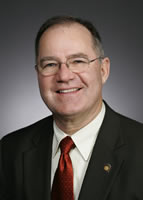In order to provide equal access and equal opportunity to people with diverse abilities, this site has been designed with accessibility in mind. Click here to view
State Senate Approves Veterinarian Incentive Act
 Sen. Roger Ballenger
Sen. Roger Ballenger
The Oklahoma State Senate approved a measure Thursday creating the Large Animal Veterinarian Incentive Act which provides incentives to veterinary school graduates to locate their practices in rural communities.
Senate Bill 70, authored by Sen. Roger Ballenger, D-Okmulgee and Rep. Jerry Shoemake, D-Morris, now goes to the House of Representatives for consideration.
The measure calls for a veterinary training program for rural Oklahoma to be administered by the Oklahoma State University Center for Veterinary Health Sciences. The program will be developed and implemented in order to provide opportunities and incentives for students pursing a veterinary medicine degree at OSU to locate their veterinary practice in rural Oklahoma communities, and receive specialized training targeted to meet the needs of livestock producers in rural communities.
“In recent years, more and more veterinarians have chosen to practice near large cities and town,” Ballenger said. “As a result, rural communities face a harsh reality: a shortage of large and small animal veterinarians. We have to do something to help slow or reverse this trend. I believe this legislation is a positive step in the right direction.”
Rep. Shoemake added “We’ve been working on this bill for the last couple of years. We are losing too many large animal veterinarians from rural areas. We need to get those individuals back practicing in these communities.”
The measure adds that if funds are available, each year the veterinary school may enter into program agreements with up to three first-year veterinary students or currently practicing large animal veterinarians with qualifying school loans. Preference shall be given to those students and large animal veterinarians who are Oklahoma residents and who agree to serve in a rural community.
The qualifying participants will receive financial help not to exceed $20,000 per year for not more than four years for tuition, books, supplies, and other school expenses, and travel and training expenses incurred by the student in pursing a veterinary medicine degree.
Participants must also engage in a full-time veterinary practice in any Oklahoma community which has a population not exceeding 25,000 for a period of at least 12 continuous months for each separate year a student receives assistance under the program, unless the obligation is otherwise satisfied. If they fail to satisfy their obligations, that person will have to repay the OSU Veterinary Center within 90 days of the failure, the amount equal to the assistance provided to the person.
Dr. Michael Lorenz, dean of the OSU Center for Veterinary Health Sciences, said the OSU plan is patterned after a similar program in Kansas.
“Our idea is to provide incentives to veterinary students to live and practice in rural communities across Oklahoma,” Lorenz said. “We look at communities that want to cooperate and help these veterinarians be successful. We believe there will many students who will want to jump on the bandwagon for these scholarships.”
 Oklahoma Senate
Oklahoma Senate

